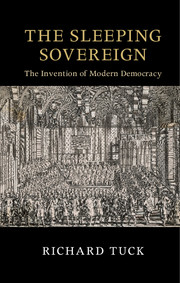Conclusion
Published online by Cambridge University Press: 05 February 2016
Summary
I now want to make some general points about the story I have been telling in this book. As I have stressed from the start, the appearance of a clear conceptual distinction between sovereignty and government was a necessary precondition for the emergence of a distinctively modern idea of democracy, in which the mass of the citizens could genuinely participate in politics as long as their participation was limited to a set of fundamental acts of legislation. Paradoxically, as we saw in Chapter 1, the distinction arose in the context of ancien régime France, and Jean Bodin's attempt to theorise the unusual constitutional arrangements of his society; but even in Bodin's work, and certainly immediately after it, the implications of his idea for a theory of democracy were quickly grasped. Before Bodin, democracy implied government by citizens, in a legislature of some kind, and though it was widely supposed that in some sense ‘the people’ lay behind all political structures, they did not do so as legislators. After him, the citizens could be thought of (if one wished) as Bodinian sovereigns, formally authorising a set of fundamental laws, though not necessarily of authoring it – does Parliament as a whole write the law? Under any system the legislator or legislature is unlikely to be the person or body that actually drafts the wording of a piece of legislation.
From antiquity down to the eighteenth century all societies had characteristically possessed sites of legislative authority that dealt indifferently with matters of general constitutional significance and matters of limited or local importance. The United Kingdom is a fine example of such an arrangement: it still possesses a site of this kind, for there is no institutional or structural difference between acts of Parliament, which undeniably have a fundamental or constitutional character, such as the Act of Settlement, the Act of Union, the Parliament Act or the European Communities Act, and – say – an act prescribing the organisation of the London police force. In this respect (as one might expect on other grounds) the United Kingdom remains premodern in its political structures, if modernity is marked (as I think it is) by precisely the kind of theorising with which I am concerned.
- Type
- Chapter
- Information
- The Sleeping SovereignThe Invention of Modern Democracy, pp. 249 - 283Publisher: Cambridge University PressPrint publication year: 2016



